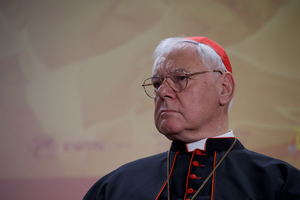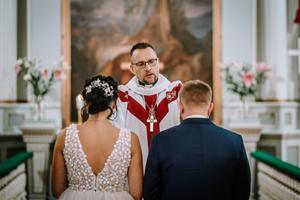Pope’s Egypt Visit Will Proceed, Despite Palm Sunday Massacres of Christians
‘I pray for the dead and the injured, and I am close in spirit to the family members and to the entire community,’ the Holy Father said.

VATICAN CITY — The Vatican has said Pope Francis’ visit to Cairo in just over two weeks’ time will go ahead as scheduled, despite two deadly bomb attacks on two Coptic Orthodox churches in Egypt on Palm Sunday.
Islamic State (ISIS) claimed responsibility for the two suicide bombs, the first of which targeted St. George’s Coptic Church in the city of Tanta, north of Cairo, where 27 people were killed.
Hours later, police stopped a bomber from entering St. Mark’s Coptic Church in Alexandria, who detonated his explosives outside, leaving 17 dead, including several police officers. More than 100 people have been injured in both attacks.
Pope Francis condemned the atrocities and called for prayers for the victims at yesterday’s Angelus address that followed Palm Sunday Mass in St. Peter’s Square. The Holy Father conveyed his “deep condolences” to Pope Tawadros II, head of the Coptic Orthodox Church, “and to all the dear Egyptian nation.”
“I pray for the dead and the injured, and I am close in spirit to the family members [of the deceased and injured] and to the entire community,” the Holy Father continued, adding: “May the Lord convert the hearts of the people who are sowing terror, violence and death, and also the hearts of those who make and traffic weapons.”
The Coptic Orthodox Church said it bade farewell to its martyrs “with great pride” after they were slain by the “enemies of humanity, the enemies of peace and the carrier of tools of destruction.” In an April 9 statement, the Church implored the Lord to keep Egypt “away from all darkness, spirit of hatred and all harm.”
ISIS said in a statement quoted by Reuters that the “crusaders and their apostate allies should know the bill between us and them is very big, and they will pay it with rivers of blood from their children, god willing. Wait for us, for we will wait for you.”
Yesterday’s attacks followed a suicide bomb Dec. 11 on the Coptic Orthodox Church of St. Peter and Paul, near the Coptic Orthodox Cathedral of St. Mark, in Cairo, which caused 28 deaths and more than 40 wounded.
Coptic Christians make up about 10% of Egypt’s population and are often victims of violence and assassinations by active jihadist militias in Sinai and the Muslim Brotherhood. After the expulsion of Muslim Brotherhood leader and former Egyptian President Mohamed Morsi in 2013, they have attacked churches, houses and shops owned by Christians.
Security Measures
The theme for the Holy Father’s visit is “The Pope of Peace in Egypt.”
He is due to visit Cairo April 28-29, and his plans have not changed. Vatican spokesman Greg Burke told the Register April 10 that it “proceeds as scheduled,” while Italian media have also quoted Vatican sources as saying there are “no second thoughts” following Sunday’s attacks, but there will be added security measures.
The Pope is understood to be determined that the visit go ahead, so he can share a message of solidarity with the Coptic Church. He also wishes to make a firm appeal for dialogue, peace and reconciliation with the Islamic institutions and Egyptian society, where Christians continue to suffer from high levels of discrimination.
As always with papal trips, the Pope’s personal protection, at the highest level, is provided by the Vatican Gendarmerie, while security and vigilance in the city will be the responsibility of the local authorities, in this case the Egyptian army and police. Both the Vatican and local security forces will be working closely together in preparing for the visit.
Being a predominantly Muslim country and only a relatively small Catholic Coptic community, large crowds are not expected, and the Pope won’t be traveling in the popemobile through Cairo’s streets. Only on April 29, when he celebrates Mass with the Coptic Catholic community in an indoor sports center, will the popemobile be used.
One of the most vulnerable moments of the trip will be on April 28, when the Holy Father makes a courtesy visit to the grand imam of Al-Azhar University, the principal theological learning center for Sunni Islam. Both the imam, Ahmed el-Tayeb, and the Pope will then address participants of an international conference on peace. According to arrangements in place, about 1,000 people will have access to that event, which will be strictly controlled.
Coptic Catholic Archbishop Emeritus Antonios Aziz Mina of Guizeh told the Italian bishops’ news agency SIR that Sunday’s attacks were “against the unity of the country, against Christians, to remind them that they have no rights, and against all the minority of the Christians of the country who anxiously await Pope Francis.”
But he said the Pope’s trip “is not at risk,” as the security measures will be “very high, and I am sure that everything will be no problem.”
Country in Crisis
The country is nevertheless likely to be be in a situation of crisis when the Pope arrives, as President Abdel Fattah al-Sisi has declared a three-month state of emergency, during which authorities will be able to make arrests without warrants and search people’s homes. The measure still needs parliamentary approval.
Last week, Coptic Catholic Archbishop Emmanuel of Luxor sought to reassure the faithful that Egypt was now “more secure“ under President al-Sisi and stressed that the Pope’s visit must demonstrate that Egyptian Christians threaten no one.
Speaking after the attacks, Archbishop Mina said attacking Christians “guarantees the terrorists great media coverage, more than hitting the army or police on the border of Sinai. It’s enough to recall how many Christians have been killed, also recently, on the [Sinai] peninsula.”
Archbishop Mina, who represented the Coptic Catholic Church in the process of drawing up a new constitution in 2014, said the jihadists’ timing of Palm Sunday and coming so close to the Pope’s visit was aimed at making their intentions “dramatically clear.”
He said many young people suffer “real and proper brainwashing at the hands of Islamic fundamentalist currents” and that “political and religious authorities must remedy this situation to avoid such kinds of acts happening again.”
The archbishop added that Egypt’s Christians will have “more than ever” the taste of blood and bitter sadness this Easter, as many families “mourn their martyrs.”
“However, we never lose hope,” he said. “These heinous acts make us more steadfast in the faith and stronger. We are not defeated. We will celebrate Easter and entrust to the visit of Pope Francis the growth of our Church that weeps other martyrs.”
“The Pope asks us to pray for God to convert the hearts of terrorists and for peace,” he said. “The Christians of Egypt are warriors of hope.”
Edward Pentin is the Register’s Rome correspondent.
- Keywords:
- edward pentin
- egyptian christians
- isis
- pope francis
















